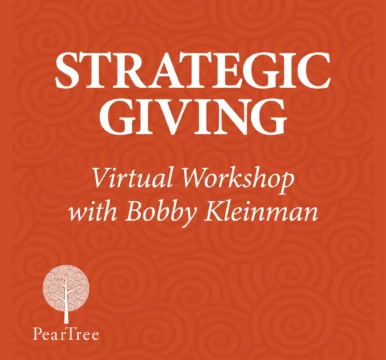This Forum contains the sole opinions & insights of the author based on forty years of providing advice to donors and charities. Others may totally disagree with the author’s views. This Forum is intended as a conversation. Robust debate is invited. Please respond with questions and alternative viewpoints to askbobby@peartreecanada.com
Thank you for the questions! For those who were unable to join the live session on Tuesday, you can find the course materials & recorded sessions here
Your Questions Answered
Question. Can you tell us more of the benefits to the donor when making a will gift with shares?
So, this question relates to the point of making a will gift with marketable securities.
As we know at the second death we are deemed to dispose of our assets at fair market value. So, if we own Publico with a cost base of $10,000 and a value at the date of death of $20,000, we will show on the final tax return a capital gain of $10,000, a taxable capital gain of $5,000 and say, tax of $2,500. If the will indicates a gift to Hospital of $20,000, the trust can pay $20,000 to the Hospital, receive a tax receipt for $20,000 and elect to use the receipt on the final tax return, which would save say, $10,000 of tax on the final tax return. If instead the estate trust transfers the Publico stock to Hospital instead of a cheque for $20,000, it will receive a receipt for the value of the gift (at the date of transfer), use it in the final return but also not recognize the $10,000 capital gain on the final return, saving an additional $2,500 of tax. Well worth it!
Question. Can you transfer low cost marketable securities to a CRT?
And I guess the continuation of the question- can you obtain the capital gain exemption? You can transfer low cost shares into a trust. The taxation of the transfer can be one of two things. If the trust is an alter ego trust then there is a tax rollover, but at the death of the donor, the final tax return will recognize the gain on the shares. I do not like that. Otherwise there is no rollover, a capital gain is realized by the donor upon transfer to the CRT, and unfortunately there is no capital gains exemption. So yes, we usually transfer to the CRT cash assets.
There is another way to obtain the exemption without using the trust. It is a little different. Make a normal marketable security donation to the charity, in this example $100,000 worth.
Take back as consideration an income stream for life of $4,000 annually. We can quantify the value of the income stream (present value of the series of payments for X years (X being the mortality chart years) and say 3% interest. Let us assume the value is $30,000. The receipt will be for $100,000 less $30,000 or $70,000. Let us assume that the gain on the shares is $50,000. So, 70% of the gain will be subject to a capital gains exemption!!!!
Question. Are reverse trusts allowed by CRA?
There is no such animal as a Reverse Trust- it is just a name I give it. What is it? A supporter can loan a Charity, say $100,000 with the objective of having the Charity invest the funds. Income earned in the fund is used by the Charity for its purposes. The loan is repayable say three months after demand. I did not use the word donor to describe the supporter as there is no donation receipt issued. No receipt no problem with CRA. If the $100,000 came out of a will with the repayment in the form of a capital distribution to a beneficiary over a period of years, no receipt, no problem with CRA.
Question. What if there is a loss in a CRT?
There is no distribution, as there is no income. We take the position that future income or value increases must replace the loss before distributions will occur.
Question. Do you do a contract with a lawyer only on contingent gifts?
No, when I refer to contracts between the charity and the donor (gift by will or insurance) I suggest using a lawyer to establish your template contract. When I was talking about spouse trusts and the necessity for a contingent gift at the second death, the lawyer creating the will, will write up the conditions of the spouse trust. This has nothing to do with the Charity.
Question. Do we use an actuary for valuation?
Yes, for a gift of an insurance policy one would use an actuary to establish the value for receipt purposes (and the name of the actuary would be on the receipt). Yes, I use the excel calculation to look at value to the charity, but that is not a third-party evaluation for receipt purposes. What we have found is that our calculations are usually close to the actuary, but a touch more conservative.
Question. Can you make sure the company has a good reputation ethically, environment, employees, etc.?
There are firms which deal with social investing that can be consulted. Practically, if you are receiving shares as a gift which will be sold immediately it is pretty tough to impose limitations. If the shares will be the exception to the rule to hold onto the shares then yes one should consult with these advisors, but if you are in a relationship building exercise with someone who can deliver those shares, make your evaluation ahead of time. Do not wait until the gift is made to determine it is off side.
Question. Are there Quebec differences with anything discussed today?
Not really. Quebec does not allow you to share a receipt with a spouse for non-cash gifts, like marketable securities or mining flow-throughs.
Question. Regarding Mining Flow-Through shares (MFTs), can we choose a specific mining company, like one that explores for lithium?
Remember the charity is not investing. It is accepting a gift of shares. Yes, pursuant to the question above, the charity can say that it does not accept mining shares, unless the mining is lithium, even if the shares are pre-sold. But your donors do not sit and shop for different mining processes. The promoters find the deals when available and offer them. Lately with gold prices high many of the deals have been with gold exploration companies. If you say you only accept lithium then better to say you do not accept mining shares at all.
Question. Why do MFT promoters require a minimum subscription?
This is better answered by the promoters. Every investment has its own set of legal agreements, segregated accounts and administration. The costs for a $5,000 subscription are the same for a $500,000 subscription. Basically, not economically feasible to do $5,000 subscriptions.
Question. What is the role of lay leadership in introducing these techniques?
There are various levels of participation. The first is having a committee which sets the policies, contracts, etc. of the programme. A committee that can really research the ideas and their benefit or advisability for your institution- not just to make off the cuff determinations. It is a lot easier to say no than admit that you don’t know.
The next level is education of the Board and particularly the fundraisers. You want them to recognize the situations where your institution can be of great value to donors. You want them to be excited about the possibilities and also proud that they are part of an organization that can be helpful, cerebral and a leader. You want them to be able to recognize the situations to bring in the staff to execute. Educating (selling) volunteers will lead to educating (selling) to new donors.
See you next Tuesday!
Bobby
Robert (Bobby) K leinman FCPA, FCA
leinman FCPA, FCA
Bobby started in philanthropy in August of 1994 by becoming the Executive Director of the Jewish Community Foundation of Montreal (JCF) which is seen to be Canada’s most donor-centred foundation.
Previously a Partner in Taxation at Ernst and Young, he is now a Planned Giving Consultant specializing in tax-assisted giving. Bobby has helped many Canadian charities design their planned giving programmes, and has written numerous articles on the subject. He is also Past-President of the Conseil de la Philanthropie du Quebec, the Table Ronde du Quebec of the CAGP, JIAS Canada, JIAS Montreal, and the Mount Royal Tennis Club.



